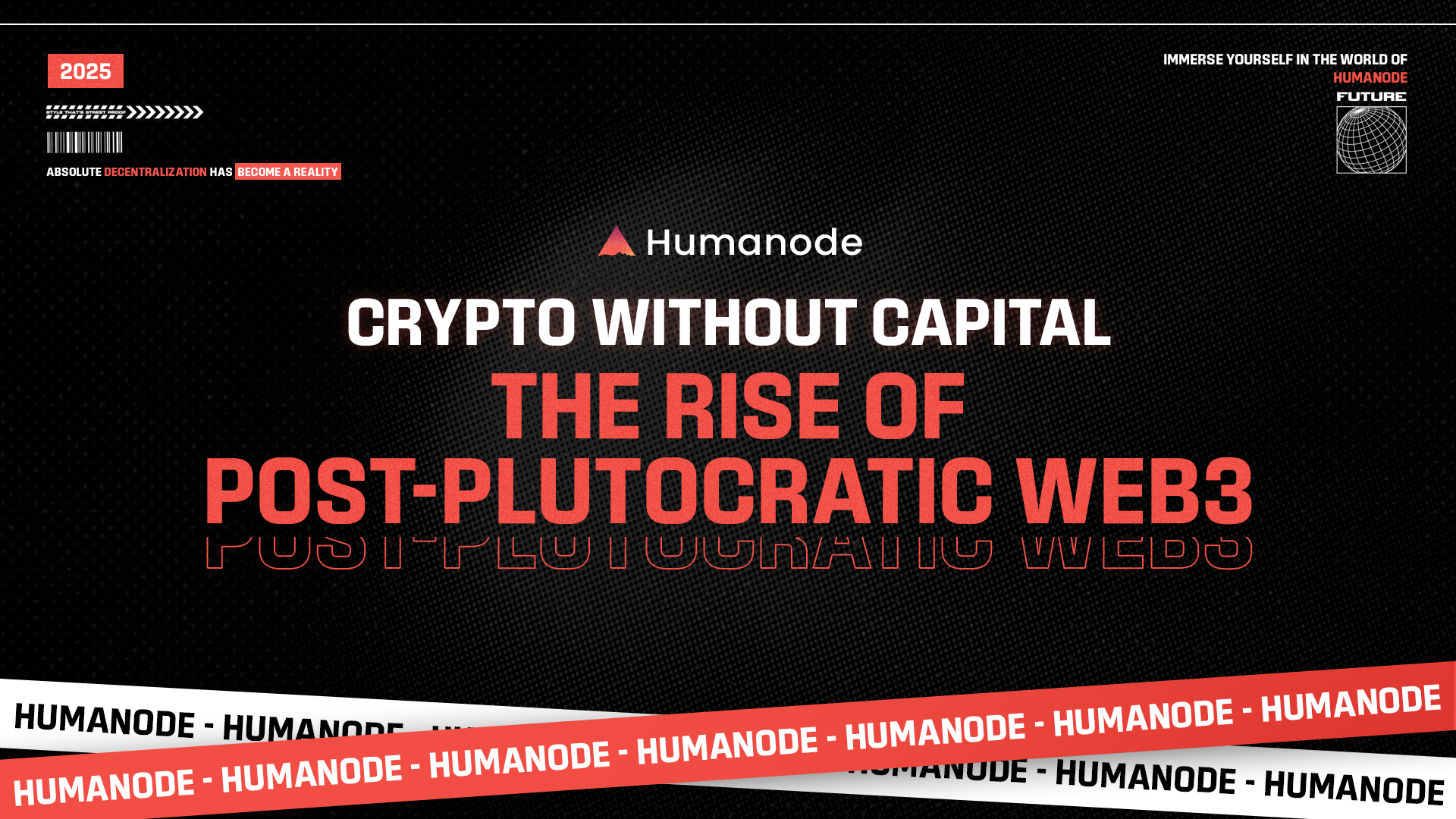Crypto Without Capital: The Rise of Post-Plutocratic Web3

By Sasha Shilina
“The liberty of a democracy is not safe if the people tolerate the growth of private power to a point where it becomes stronger than their democratic state itself.”
— Franklin D. Roosevelt, 1938
“Money is a new form of power, and as such it must be controlled by political means.”
— Hannah Arendt, The Origins of Totalitarianism, 1951
I. The Hidden Plutocracy of Web3
For a movement that began as a rebellion against centralized finance, Web3 has quietly replicated many of the very hierarchies it sought to dismantle. Today, the vast majority of decentralized networks operate under a simple rule: those with more tokens hold more power.
This is not merely economic logic. It is governance by capital, the silent normalization of plutocracy within the protocols of supposed decentralization.
Whether it’s governance votes weighed by token stake, validator sets determined by financial commitment, or grant programs gamed by those with the most liquidity, the majority of crypto networks reward those who already own the means of participation.
The dream of a trustless, open world has become gated, not by identity checks, but by wallets.
And yet, a different model is emerging: one in which power flows not from capital, but from presence. Humanode, an experimental Layer 1 protocol that replaces token-based validation with biometrically verified equal human nodes, proposes an inversion:
What if every living, unique person had one validator slot?What if no amount of wealth could buy more voice?
This is not just Sybil resistance. It is a political provocation.A proposal for a post-plutocratic Web3.
II. Humanode’s Architecture: One Person, One Voice
At the core of Humanode lies a deceptively simple principle: One person, one node, one vote. Each participant undergoes a privacy-preserving biometric verification process that ensures they are a real, unique, living human being without revealing their identity or storing sensitive data [1].
This mechanism provides strong Sybil resistance without financial cost, meaning that individuals don’t need to stake capital to prove their legitimacy. In doing so, it removes the structural bias that favors early adopters, wealthy actors, or automated botnets.
Unlike token-weighted consensus systems (e.g., Proof-of-Stake), Humanode’s “Proof-of-Biometric-Uniqueness” (PoBU) effectively levels the governance field. Participation is no longer a function of your portfolio; it is a function of your existence.
This is a profound philosophical shift: from governance by ownership to governance by being.
III. Why Post-Plutocracy Matters
Capital-based governance has many justifications: skin in the game, efficiency, protection from spam. But it also leads to predictable outcomes:
- Governance capture by whales or VCs;
- Inequality of voice within communities;
- Manipulation of voting outcomes through delegation and vote buying;
- Alienation of ordinary users, whose participation is symbolic at best.
In a world where decentralization is increasingly about infrastructure (how we coordinate research, fund science, build public goods), who gets to decide is not a technical question. It is a political one.
Post-plutocratic systems aim to restore the core ideal of democratic legitimacy: One voice, one vote.
And when identity is verified without compromising privacy, the risk of fraud is reduced without sacrificing inclusion.
This opens the door to new forms of protocol citizenship, where participation is not priced, but recognized.
IV. Philosophical Lineage: From Property to Presence
The idea that capital should confer political power is deeply embedded in Western political thought, but so too is its critique. To imagine a post-plutocratic Web3, we must understand the traditions it both inherits and disrupts.
In the 17th century, John Locke provided one of the earliest justifications for private property, linking it to the labor of the self. “Every man has a property in his own person,” he wrote, and thus in what he produces [2]. This notion of property as a natural right underpinned both liberal capitalism and, eventually, modern democracies. But it also birthed a dangerous equivalence: that what you own could stand in for who you are.
By the 19th century, John Stuart Mill, a staunch liberal, struggled with this contradiction. While supporting democratic expansion, he proposed plural voting, where the wealthy or educated would receive more votes than the poor or uneducated. Mill’s fear of “the tyranny of the majority” led him to endorse a quantified politics, one in which merit, measured largely by wealth and education, could be algorithmically privileged [3].
This is the spiritual ancestor of token-weighted governance in Web3.
But there has always been resistance.Jean-Jacques Rousseau warned that true freedom was impossible when inequality reigned. In his Social Contract, he argued that sovereignty must lie in the collective will, not in the hands of those with more property or prestige [4]. To him, the function of democracy was not to reflect market relations, but to transcend them.
Later, Karl Marx identified capital not as a neutral medium, but as a structural distortion of human freedom. For Marx, political rights in a capitalist society are like water in a sieve: present, but never enough to quench real powerlessness [5]. Rosa Luxemburg went further, asserting that without economic equality, democracy is a facade, a stage managed by those who own the theater [6].
In the 20th century, Hannah Arendt re-centered the problem of appearance and recognition. In her view, political freedom is only possible in a public realm, a shared space of speech, action, and mutual visibility [7]. But when capital becomes private power, it erodes that space. What begins as property becomes silence: the disenfranchisement of those who cannot pay to be heard.
More recently, theorists like Michael Sandel [8] and Elizabeth Anderson [9] have extended this critique into the late capitalist world. Sandel warns of the moral limits of markets, that when everything is for sale, including influence, the common good begins to rot. Anderson, too, notes how market-based models of governance erode civic equality by treating people as customers rather than co-legislators.
These concerns are not abstract. In Web3, we see them materialize daily:
- Protocols where early token holders entrench control.
- DAOs where whales dictate treasury flows.
- Voting mechanisms are designed not for fairness, but for stake-weighted efficiency.
What Humanode proposes is a break. A shift from the logic of ownership to the ethic of presence.
By grounding validator status in biometric Proof-of-Personhood, Humanode revives the ancient democratic intuition that being alive, and only that, is enough to belong. You do not buy your voice. You arrive with it.And that arrival is not mediated by tokens, reputation, or social capital; it is cryptographically affirmed through your living, singular body, without revealing who you are.
In this light, Humanode is not just a technical solution to Sybil attacks. It is a political proposal: that democracy in digital space must begin where liberalism forgot to look, not in the market, but in the mirror.
V. Use Cases: Where Capital Shouldn’t Rule
There are domains where token-weighted voting is actively harmful, not just unfair, but dysfunctional:
- Public goods funding: Quadratic funding already acknowledges the distortion of capital concentration; Humanode’s model would enhance fairness by removing Sybil attacks entirely.
- Scientific governance: In decentralized science (DeSci) projects, staking power may overshadow scientific merit. A person-based validation system could restore epistemic legitimacy.
- Community DAOs: In networks meant to support local governance, mutual aid, or marginalized groups, capital-based entry recreates the very inequities these projects aim to solve.
- Global basic income experiments: Capital-independent identity is essential to prevent fraud while maintaining inclusivity.
These are not hypothetical cases; they are active frictions in the DAO ecosystem.
VI. Open Questions
A world without capital gates is not without its own challenges.
1. Biometric Exclusion
Despite Humanode’s focus on privacy and device-level validation, biometrics can fail due to physical differences, trauma, or device access limitations. A truly inclusive system must accommodate edge cases, disabilities, and technological inequality.
2. Governance Gridlock
Equity does not always mean efficiency. Without weighted incentives, decision-making may slow. Mechanisms like reputation scores, rotating councils, or liquid participation might be needed to balance deliberation and action.
3. Gaming the System
While Sybil attacks are mitigated, the political nature of participation introduces new risks: bot-assisted behavior shaping, coordinated misinformation, identity marketplaces. Protocols must evolve alongside adversaries.
4. Power Without Accountability
Ironically, making participation too “easy” could reduce perceived responsibility. If everyone has a voice, but no one is economically accountable, will protocols suffer from tragedies of the commons?
These concerns must be designed against, not used as excuses to retreat into token logic.
VII. Post-Plutocratic Possibilities
What might a post-capital governance structure look like in practice?
- Hybrid DAOs that use Humanode for identity gating, but allow optional delegation, conviction voting, or domain-specific credentials.
- Plural voting systems that blend “one person, one vote” with contribution-based scoring (reputation, labor, expertise).
- Universal validator access where anyone can run a node without upfront capital, enforced by biometric uniqueness.
- Recursive funding DAOs that dynamically allocate budgets based on verified participation, not wealth.
In such models, capital is no longer the key to sovereignty. It becomes a tool, not a gatekeeper.
VIII. The End of Capital as Citizenship
The most radical aspect of Humanode is not its biometric tech. It is its political stance: That being human is enough to matter.
In a world where crypto governance has increasingly been privatized, where participation is sold, not earned, Humanode offers a different invitation: To show up. To breathe. To be counted.
If Web3 is to become more than financial infrastructure, if it is to host art, science, and public life, it must free itself from the tyranny of capital. It must learn to recognize humans as more than wallets.
A post-plutocratic Web3 does not erase markets. It merely ensures that markets do not erase us.
Footnotes
- Humanode Whitepaper. https://whitepaper.humanode.io/
- Locke, J. (1689/1988). Two Treatises of Government (P. Laslett, Ed.). Cambridge University Press.
- Mill, J. S. (1861/1991). Considerations on Representative Government. Prometheus Books.
- Rousseau, J.-J. (1762/2012). The Social Contract. Penguin Classics.
- Marx, K. (1848/1978). The Communist Manifesto. In R. Tucker (Ed.), The Marx-Engels Reader (pp. 469–500). W. W. Norton & Co.
- Luxemburg, R. (1906/2004). The Mass Strike, the Political Party, and the Trade Unions. Haymarket Books.
- Arendt, H. (1958). The Human Condition. University of Chicago Press.
- Sandel, M. J. (2012). What Money Can’t Buy: The Moral Limits of Markets. Farrar, Straus and Giroux.
Anderson, E. (2017). Private Government: How Employers Rule Our Lives (and Why We Don’t Talk About It). Princeton University Press.

